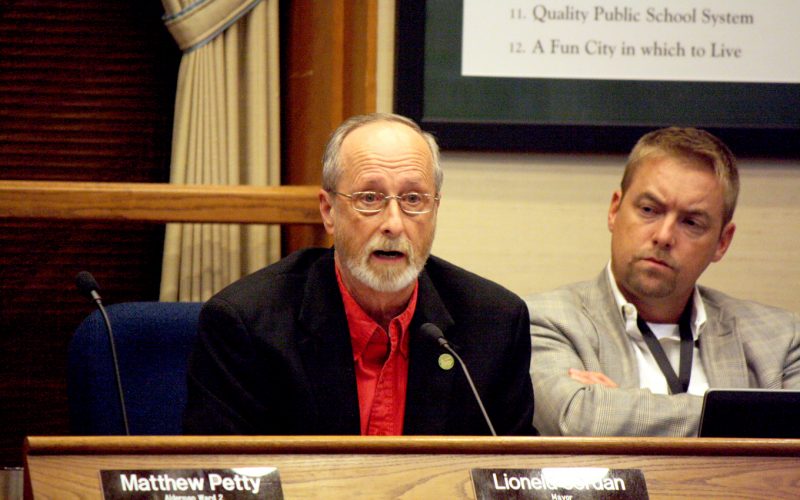
Staff Photo Nick Brothers
Fayetteville Mayor Lioneld Jordan said he was in support of the ordinance that would prohibit home and business owners from evicting, denying or firing a person based on their sexual orientation or gender identity. “We need to quit looking at what people are and start looking at who they are,” he said.
The Fayetteville City Council voted 6-2 to pass the Uniform Civil Rights Protection Ordinance Tuesday night after several hours of public discussion. The law will not take effect unless voters approve the measure in September.
In a nutshell, the ordinance, if passed, will provide recourse for citizens who have been fired or denied employment or housing because of their sexual orientation or gender identity.
One of the major differences of this ordinance compared to last year’s Ordinance 119 — which was narrowly repealed in a public vote — is that there is a civil rights commission that handles complaints of alleged discrimination rather than a single administrator, said City Attorney Kit Williams.
The commission would consist of seven members: two representatives of the business community; two owners or managers of rental property; one representative with experience in human resources or employment law; and two citizens at large, at least one of whom identifies as lesbian, gay, bisexual, or transgender.
Anyone with a claim of discrimination would be required to present their claim in writing to the city attorney, who would inform the Civil Rights Commission that a complaint had been received.
Informal and confidential mediation would be attempted by the city before any other enforcement measures could begin. If that doesn’t work, the commission schedules a hearing to review the complaint and gather evidence for a case. If the commission determines that the discrimination claim is valid, the violator would be fined up to $100 for the first offense. Further violations would carry the city’s general penalty which calls for fines of up to $500. However, a violation is not considered a misdemeanor or felony.
Also in this ordinance, the language specifically exempts churches, religious schools and daycare facilities, and religious organizations of any kind from the new law.
The hot button issue for the use of public facilities, e.g. bathrooms, is also addressed and protected in the ordinance.
You might remember that Arkansas Senate Bill 202 (Intrastate Commerce Improvement Act [Act 37]) passed earlier this year which attempted to block all Arkansas cities from creating protected classes, thus leaving civil rights to be determined at the state level. Once that bill goes into law in July, litigation could arise, Williams said.
However, the law prohibits “an ordinance, resolution, rule or policy that creates a protected classification or prohibits discrimination on a basis not contained in state law.”
However, there is a basis for protecting LGBTQ from a state anti-bullying law, according to Little Rock City Attorney Tom Carpenter.
When Little Rock considered drafting a civil rights ordinance in April, Carpenter found and cited portions of Title 6, Chapter 18 of Arkansas Code, which prohibit bullying in public schools on the basis of several classes, including sexual orientation and gender identity. So, at least in Carpenter’s legal opinion, the ordinance would not be in violation of Act 37 because those protected classes already exist in state law.
Alderwoman Adella Gray and Alderman Matthew Petty proposed The Uniform Civil Rights Protection Ordinance to replace the Civil Rights Administration Ordinance after its repeal late last year. Much of the language has been clarified compared to the previous civil rights ordinance, which was criticized as too vague and legally incomplete by the Fayetteville Chamber of Commerce. However, the Chamber of Commerce supports the new ordinance.
Public Comment
About 50 people spoke at the Tuesday, June 16 city council meeting. By the end of the night, more were in favor of the law than against.
Those against the law spoke largely within three arguments: it harms public conscience, the cost of the special election (upwards of $35,000) could and should be used to better purposes, why put forth something that was voted down by the public not long ago and that it is a “regulatory” nightmare that will harm businesses.
A woman named Linda said she believes this ordinance violates her freedom of conscience. She used the example that when she buys a bottle of wine, a cashier she sees often chooses not to sell her that wine because it violates her conscience so she has someone else ring her up.
“Just like if someone wanted me to write ‘I hate fags’ on a cake, that would violate my conscience, because I don’t agree with it,” she said. “I don’t want to force anyone to do something they’re not comfortable with.”
A business owner said he took Fayetteville off his list of prospects because he felt the ordinance would be too hindering for him to conduct business.
Paul Phaneuf, who ran for city council against Alderwoman Adella Gray, said that he found the bill divisive and too authoritarian.
A number of people who identify as LGBTQ brought forth examples of discrimination they’ve faced in Fayetteville to show their need for the ordinance.
“I can’t go to Wal-Mart without feeling like a sideshow attraction,” said Lisa Stuart. “That’s just the best case scenario. With or without this ordinance, stares and whispers can turn into violence in an instant. Statistics say I have a 1 in 12 chance of being murdered because I am a trans woman.”
Justine Turnage said she had been denied a job after her potential employers found out she was transgender.
“Last campaign showed where the problems of discrimination are,” Turnage said. “It really exposed what the problem is. We were dehumanized and humiliated. I woke up to a radio alarm to a man saying people like us were predators. Before I even woke up I faced discrimination. We have been forced to endure. We needed this done and we need it now.”



